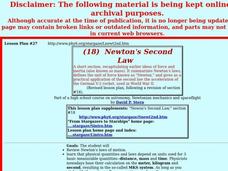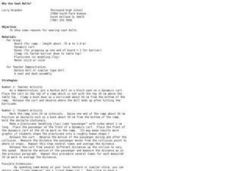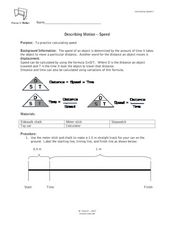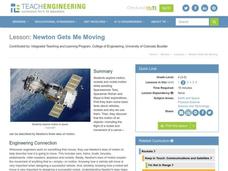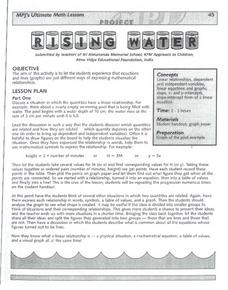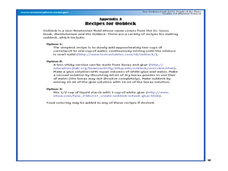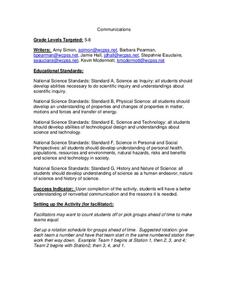Curated OER
Aeronautics: Bernoulli's Principle
Students explore physics by participating in a science activity in class. In this flight properties lesson, students identify Bernoulli's principle of flight and his theory of statics and motion. Students conduct a demonstration by...
Curated OER
Cannonball
Students calculate the speed, motion and distance of a projectile. In this geometry lesson, students obtain measurements while calculating velocity. They graph their results and make predictions.
Curated OER
Newton's Second Law
Students examine how physical quantities and laws depend distance, mass and time. They examine the MKS system; meter, kilogram and second, for doing calculations.
Alabama Learning Exchange
This Is How We Roll!
Students research how roller coasters work. In this physics lesson, learners research the history of roller coasters and the safety factors in the design of a roller coaster on the website www.learner.org/exhibits/parkphysics. They...
Curated OER
Alka-Seltzer Rockets: How to Build Your Own Rocket
Students create a rocket using Alka-seltzer of baking soda and vinegar. In this physics lesson, students identify the factors affecting the length of time the rocket is propelled. They relate this activity to actual rocket launched in...
Curated OER
Soda Straw Rocket Activity
Students construct a rocket using soda straw. In this physics lesson, students determine the nose cone length that produces the best rocket. They explain the importance of using a control in an experiment.
Curated OER
Introduction to Forces and Inertia
Young scholars explore the basic underlying concepts of Newton's first law of motion. They discuss forces and brainstorm different examples of force and what they act on. Students examine force by observing springs and gravity. They...
Curated OER
Why Use Seat Belts?
Students explore reasons why using a seat belt is a safe choice while riding in a car. In this physics/safety instructional activity, students set up and observe a doll with and without a seat belt moving down a ramp in a dynamics cart....
Curated OER
Study of Projectile Motion using Straw Rockets
High schoolers design and launch their own rockets. In this experimental lesson students launch their own rockets and record the various angles and distance that they go. Each student has time to redesign their rocket and have a...
Curated OER
Momentum Conserved
Students explore Newton's Laws of Motion and how momentum is conserved. In this physics instructional activity, students observe experiments in which various items collide. Students draw conclusions as to how "momentum" defined as "mass...
Curated OER
Marbles and Momentum
Students examine the law of conservation of momentum. In this physics lesson, students play marbles in order to compare the mass of the marble and velocities effects. Students receive directions of the marbles game and collect data while...
Curated OER
Describing Motion-Speed
Students study speed and learn how to calculate it. In this investigative lesson students participate in an activity that shows them how to calculate speed then they fill out a worksheet.
Curated OER
Chapter 3 and 4 Review
In this physics review worksheet, students complete 42 matching, fill in blank, and problem solving questions pertaining to Newton's laws, force formulas, distance formulas, and simple machines.
Curated OER
Falling Objects
High schoolers examine the velocities of two different falling objects. They produce distance vs. time and velocity vs. time graphs using a Motion Detector and a CBL 2 to collect experimental data. Learners analyze and interpret the...
Curated OER
Race the Track! The Time Challenge (lesson 2)
Learners design a track that keeps a ball in motion for 5 seconds or longer. In this designing lesson plan, students explore force, gravity, and cause and effect when it comes to science and building before building their own track.
Curated OER
Race the Track! Super Slope (Lesson One)
Fifth graders utilize basic physics concepts to calculate speed of an object set in motion from various heights. In this basic physics lesson plan, 5th graders make observations, calculations, record data, and conclusions throughout...
Curated OER
Newton Gets Me Moving
Students discuss Newton's laws of motion. The conduct motion experiments by building "Newton Rocket Cars" from assorted materials. They propel the cars with rubber bands and wooden blocks and record the distance traveled on data sheets.
Curated OER
Design Your Own Rube Goldberg Machine
Students participate in a culminating activity for a unit on Energy and Simple Machines. They are challenged to incorporate simple machines in to a complex mechanical system. While designing and testing their machine they will also...
Curated OER
Rising Water!
Students observe water change from a liquid to a gas state when heated and then return to its liquid stage when cooled. They learn that gas molecules move faster than liquid molecules. They discover physical properties that describe how...
Curated OER
Puzzle of the Plates
Students research tectonic plates and their movement. In this plate lesson, students describe the motion of these plates and the boundaries between them. They look into the San Andreas Fault and explore the earthquakes associated to this...
Curated OER
Mr. and Miss Big Feet
Third graders experiment with gravitational force. In this physical science lesson, 3rd graders send matchbox cars off a ramp while changing the amount of weight attached to the car. Students record their data and discuss the results.
Curated OER
Review of Oscillations
In this oscillations worksheet, students complete 50 multiple choice questions on forces, motion, periodic motion and simple harmonic motion.
Curated OER
Hovercraft Racers!
Students gain first-hand experience on how friction affects motion. They build a hovercraft using air from a balloon to levitate a craft made from a compact disk (CD), learning that a bed of air under an object significantly reduces the...
Curated OER
Communications
Students incorporate different disciplines into this lesson. In this science lesson, students investigate the use of communicating without words, and how it is different than communicating with words. They discuss the pros and cons of...




